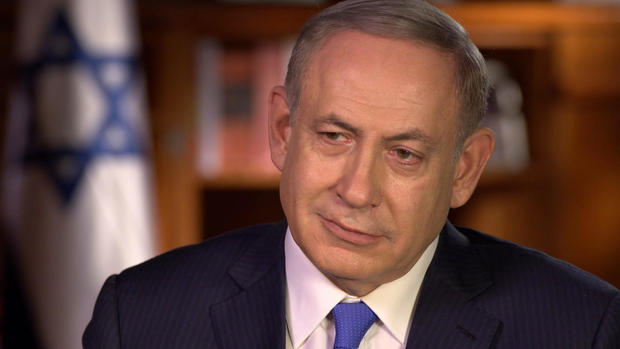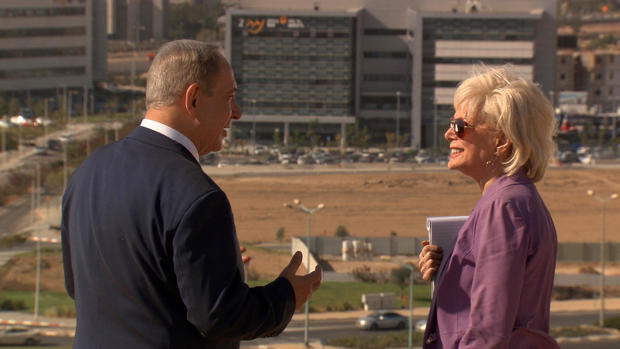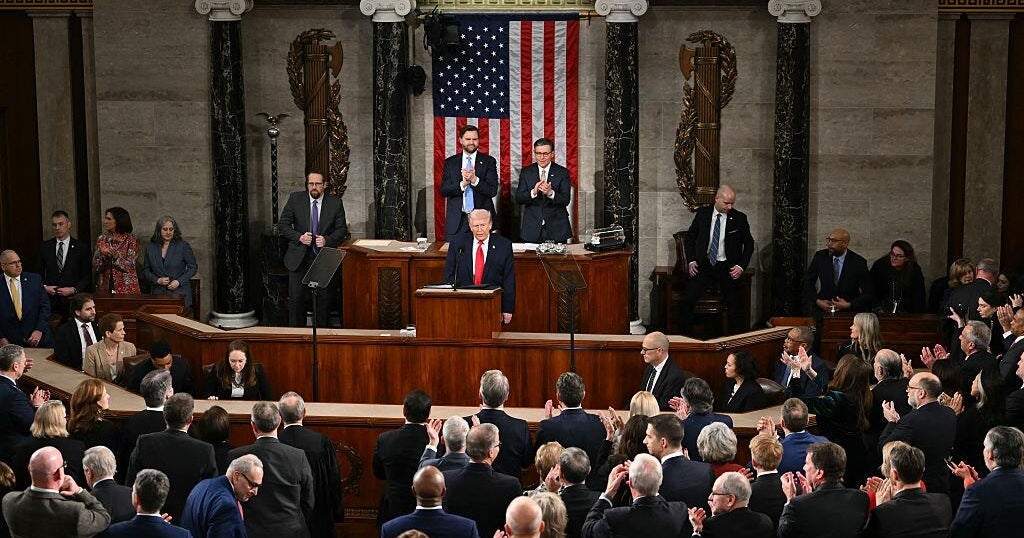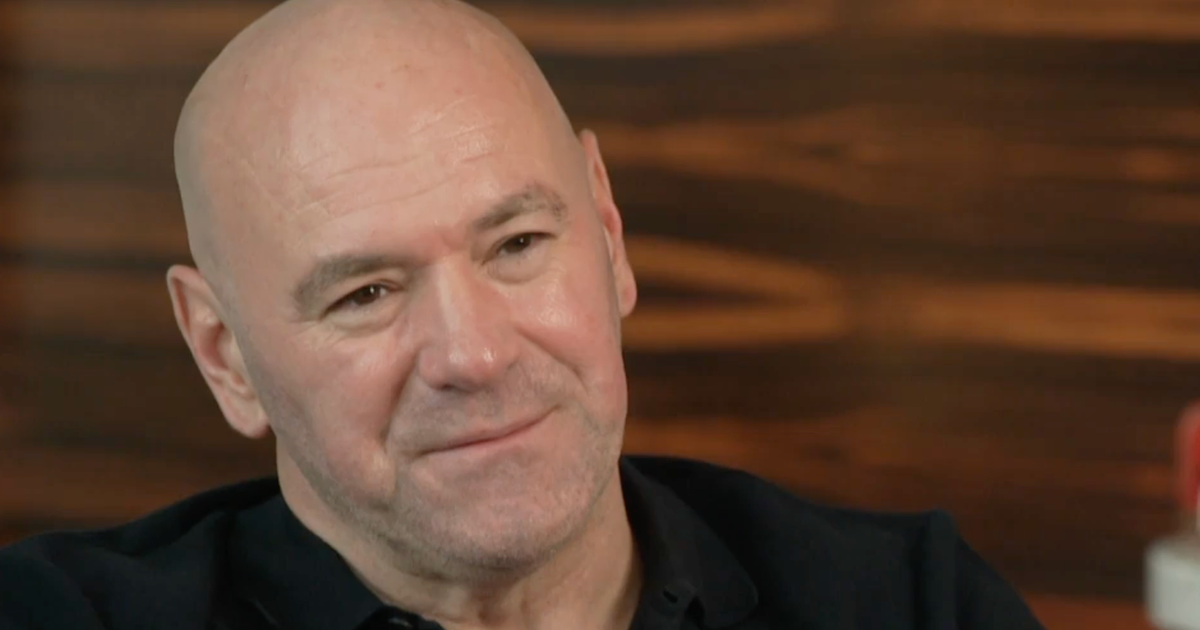Israel's prime minister welcomes Trump presidency
The following is a script from “Prime Minister Netanyahu,” which aired on Dec. 11, 2016. Lesley Stahl is the correspondent. Shachar Bar-On and Alexandra Poolos, producers.
On our recent trip to Jerusalem, we found a surprisingly optimistic Benjamin Netanyahu, who has served the longest stretch as prime minister in Israel’s history. He told us his country has never felt as secure or less isolated. But it’s been a tumultuous eight years between Israel and the U.S. over the Iran nuclear deal and the expansion of Jewish settlements in the occupied West Bank. So part of his optimism relates to the election in the U.S. Netanyahu and his followers on the Israeli right, are greeting the idea of President Donald Trump with a resounding l’chaim.
Benjamin Netanyahu: I know Donald Trump. I know him very well. And I think his attitude, his support for Israel is clear. He feels very warmly about the Jewish state, about the Jewish people and about Jewish people. There’s no question about that.
Lesley Stahl: With Trump, do you think that Israel will not be as at odds with the United States as you have been under the Obama administration?
Benjamin Netanyahu: Yeah, we had differences of opinion with-- I had differences of opinion with President Obama and most well-known, of course, is Iran.
Lesley Stahl: Was it personal between the two of you?
Benjamin Netanyahu: No. No. I don’t think so. I think that suppose we had the greatest of personal chemistry, OK? So, what? You think I wouldn’t stand up against the Iran deal if I thought, as I did, that it endangers the existence of Israel? Of course I would.
He says it wasn’t personal but there were times when it sure seemed that way. The relationship, often rocky, hit bottom when Mr. Netanyahu took the provocative step last year of lobbying against the Iran nuclear deal and by extension President Obama in a speech before Congress.
Netanyahu in Congress: It doesn’t block Iran’s path to the bomb, it paves Iran’s path to the bomb. So why would anyone make this deal?
Lesley Stahl: When you campaigned against him and you spoke to the Congress, it was read as a lack of respect and something that had never been done before.
Benjamin Netanyahu: No, it was not borne of any disrespect, because I have the greatest respect for him. I had then and I have now.
Lesley Stahl: But do you regret that you did that?
Benjamin Netanyahu: No, on the contrary. I think it’s my responsibility, to speak up when something threatens our very future.
He’s says he’s going to see Mr. Trump soon to lobby him to scuttle the deal. The president-elect has called the agreement “stupid” and “a disgrace.” But Trump’s choice for defense secretary, General James Mattis, has advised against pulling out.
Lesley Stahl: If it were to be abrogated wouldn’t that put you in a more precarious position than you are now? Because they would obviously then rush to the bomb.
Benjamin Netanyahu: I think Iran didn’t rush to the bomb before there was a deal.
Lesley Stahl: Really?
Benjamin Netanyahu: No, because they were afraid of retribution.
Lesley Stahl: But if-- OK, you get rid of the deal. Then what?
Benjamin Netanyahu: I think what options we have are much more than you think. Many more. And I’ll talk about it –
Lesley Stahl: Like what?
Benjamin Netanyahu: --with President Trump. Well, I think quite a few, actually.
Lesley Stahl: Because if you, you know, put sanctions back on, the other signatories to the deal won’t.
Benjamin Netanyahu: There are ways, various ways of undoing it.
Lesley Stahl: You have something in your mind.
Benjamin Netanyahu: Yeah, I have about five things in my mind.
Lesley Stahl: Well, give me one.
Benjamin Netanyahu: Well, I’d like to talk to the president before I talk to the 60 Minutes.
Lesley Stahl: What about the intelligence that the West is getting from on-site inspections? Apparently, most of the intelligence community thinks it’s worth keeping the deal for that intelligence.
Benjamin Netanyahu: I think we have-- the deal is not the critical thing of intelligence. Intelligence is a critical thing.
Lesley Stahl: Which Israel is really good at.
Benjamin Netanyahu: Which is-- we’re very good at. And you know, with a little help—
Lesley Stahl: So you don’t think we’re—
Benjamin Netanyahu: --from our friends.
Lesley Stahl: --gaining that much by these on-site inspections?
Benjamin Netanyahu: For intelligence?
Lesley Stahl: Yeah.
Benjamin Netanyahu: No.
Lesley Stahl: What about the silver lining? That because of this deal, you now have all this-- these better relationships with your neighbors.
Benjamin Netanyahu: Oh, well, that’s true. I would say- I will say this. The only good thing I can say about the deal with Iran is that it brought the Arab states and Israel closer together.
It’s the old proverb: the enemy of my enemy is my friend. On a trip to the desert town of Be’er Sheva, he told us there’s been a tectonic shift: it’s been reported that Israel and the Arab world are sharing intelligence.
Benjamin Netanyahu: All I can tell you is that Israel’s position in the Arab world has changed because they no longer see Israel as their enemy, but as their ally, in their indispensable battle against the forces of militant Islam, either those led by Iran, the Shiites, or-- and those led by Daesh – by ISIS, the militant Sunnis.
Lesley Stahl: We hear that you have dramatically improved your relationship with Egypt. Is that correct?
Benjamin Netanyahu: Yes.
Lesley Stahl: Jordan?
Benjamin Netanyahu: Yes.
Lesley Stahl: Saudi Arabia?
Benjamin Netanyahu: No comment.
Lesley Stahl: I have to ask you, because it’s the most fascinating of all: Israel and Saudi Arabia. Are you actually developing an anti-Iran alliance in the Middle East?
Benjamin Netanyahu: Doesn’t have to be developed. It’s there anyway.
Israel is developing a whole skein of new alliances, in some cases with countries that have been challenging the U.S. around the world like Russia which has placed its troops in Syria, Israel’s next door neighbor.
Lesley Stahl: How would you describe your relationship with Russia right now?
Benjamin Netanyahu: It’s amicable. But the minute Mr. Putin decided to put his military forces in Syria, I went to see him. And I said, “Look, here’s what I’m doing. I’m not intervening in Syria. But at the same time, if Syria tries to intervene with us, if Iran tries to use Syria to attack us, we’ll stop it.
Lesley Stahl: You’re telling Mr. Putin that you will attack?
Benjamin Netanyahu: I said, “We should avoid this.” And he said “I agree.” So we coordinated between our militaries because no one wants an inadvertent Israeli-Russian clash.
Lesley Stahl: You have a friendship with Mr. Putin, and a friendship with China. You seem to be inching toward an anti-American bloc.
Benjamin Netanyahu: God, no. Let me tell you something—
Lesley Stahl: Well, talk about that ‘cause I think there’s an impression of that.
Benjamin Netanyahu: That’s a false impression. First of all, there is, there is an irreplaceable ally. It’s called the United States of America.
Lesley Stahl: Yeah, but here you are making friends with our adversaries—
Benjamin Netanyahu: So no. You have relations with Russia and you have relations with China. We can have relations, economic relations, trade relations with other countries as you do. Why not?
He has used economic and trade relations to improve Israel’s standing in the world by selling and in some cases giving away its high-tech inventions. Israel boasts of more start-ups per capita than anywhere in the world, many based in Be’er Sheva, and nations have lined up to buy drones, as India has, and cutting-edge agricultural technology, as China has. There’s excitement about a new innovation that extracts drinking water out of air.
Lesley Stahl: So this is Israeli diplomacy through technology?
Benjamin Netanyahu: Exactly right.
Lesley Stahl: Countries that used to vote against you regularly at the U.N., are now your clients. I mean African nations - .
Benjamin Netanyahu: It’s a revolution there. We can’t keep up.
What’s surprising is that he’s making progress with all these countries without making any progress with the Palestinians, who’ve lived under Israeli occupation in the West Bank for half a century.
Lesley Stahl: What about the quality of Palestinians’ lives. You know, it’s 50 years since what people call “the occupation.” It’s 50 years. You still have checkpoints. People have to be cleared. Soldiers everywhere in their lives.
Benjamin Netanyahu: Actually, I’ve lifted checkpoints quite a bit and
we’re trying to create bridges and thoroughfares and so on so we can have freer movement. Palestinians know-- they look at Aleppo in Syria, and they look at Yemen, and they look at Libya, and they look at other places, and they know that our intention is coexistence.
Lesley Stahl: You told us that Israel is less isolated today than it has been in many years in the past. And yet, at the same time, you’re losing support in-- in Western Europe.
Benjamin Netanyahu: Isolated?? All these countries are coming to Israel and it’s a fantastic change.
Lesley Stahl: But not Western Europe. Not you, your natural allies, or your older allies yet.
Benjamin Netanyahu: Well, they’re coming—
Lesley Stahl: They call you colonials.
Benjamin Netanyahu: They’re coming around too.
Lesley Stahl: But they call you occupiers.
Benjamin Netanyahu: Well they call us a lot of things but I think they’re coming around too, I have to tell you.
But criticism has spread, on U.S. campuses too.
Lesley Stahl: There’s a movement called BDS, to boycott, divest, and sanction Israel and its products, because of the Palestinian issue, the unresolved Palestinian issue. And this is the playbook that they used, you know, against Apartheid in South Africa—
Benjamin Netanyahu: Yeah, well, I don’t buy it. It’s not about this or that issue. It’s against the very existence of the State of Israel.
Lesley Stahl: You know what they want? I know what they want. They want you to stop expanding and building settlements.
Benjamin Netanyahu: Yea, well, we did. We stopped. We stopped in Gaza. We tore out the settlements and gave the Palestinians Gaza. And what happened? Did we get peace? We got 20,000 rockets on our heads and terror tunnels.
Still, his critics argue that’s not a justification. For the steady expansion of the settlements in the West Bank. Those settlements are smothering Palestinians’ hope for their own separate state.
Benjamin Netanyahu: I think the obsession, the focus on settlements as though this were the issue and this is the obstacle to peace, I disagree with that.
Lesley Stahl: But it is an obstacle. I mean—
Benjamin Netanyahu: No, it’s not an obstacle.
Lesley Stahl: Well, you say that, but they don’t say that.
Benjamin Netanyahu: Yeah, but I’ll say something else. The real reason we haven’t had peace is because of a persistent refusal of the Palestinians to recognize a Jewish state in any border. “You ask us to recognize you, I’m willing to do that. I ask you to recognize us. Recognize the Jewish state, for God’s sake.” And if they do, this thing will begin to correct itself very quickly.
It’s a condition he doesn’t put on his new friends.
Lesley Stahl: Have any of the Arab states said they accept Israel as a Jewish state?
Benjamin Netanyahu: Yeah they say a lot of things in various forms.
Lesley Stahl: And never actually said they accept you.
Benjamin Netanyahu: Do they say it publicly at this point? Not yet.
He acknowledges that the Arab states want to see movement on the Palestinian issue. But despite Washington’s call for a halt, settlement expansion has continued, even after the U.S. gave Israel a $38 billion military aid package. Netanyahu and the Palestinian leader Mahmoud Abbas recently greeted each other at the funeral of former Israeli President Shimon Peres. But the two have not held open, direct negotiations in over six years, for which they blame each other.
Lesley Stahl: What kind of a state is it going to be if you just, you know, don’t do anything?
Benjamin Netanyahu: I’m not going to just not do anything. I’m going to do something.
Lesley Stahl: Well, if you don’t negotiate with the Palestinians—
Benjamin Netanyahu: Well, I’m willing to negotiate with them at any moment.
Lesley Stahl: And if it doesn’t happen?
Benjamin Netanyahu: I haven’t reversed my position. I’ve said, “Look, we will solve this because we want two nation states at peace and with the proper security arrangements.
Lesley Stahl: You would be pushing for a two-state solution if that—
Benjamin Netanyahu: Two states for two peoples. And that’s where I’m focused. Yeah, I’d like to have President Trump, when he gets into the White House, help me work on that. I’d like to see if the Arab states can help me achieve that. It’s a new reality. A new possibility.






